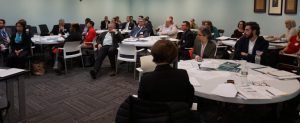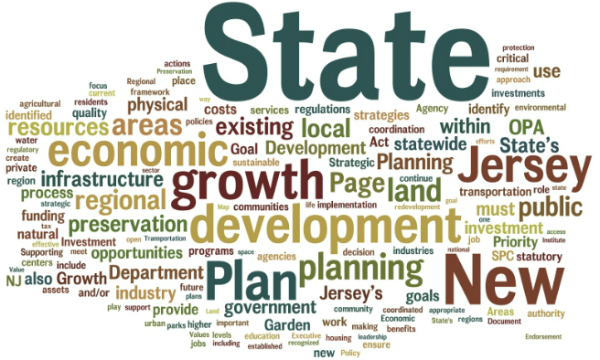New Jersey Future Blog
Guide Helps Unlock New Resources for Stormwater Management
March 23rd, 2017 by New Jersey Future staff
This article was written by Kessie Alexandre, a Ph.D. candidate in the Department of Anthropology at Princeton University and an intern at Jersey Water Works.

Workshop participants consider possible CSO+ project focus areas including economic development and redevelopment, parking and street upgrades, public housing, public health, energy efficiency, schools, broadband and internet access, and coastal protection.
On March 8, the New Jersey Combined Sewer Overflow (CSO) Permittee Network convened to share lessons and to brainstorm ideas for the future of stormwater management across the state. Held at the North Hudson Sewerage Authority, the meeting included a multimodal CSO+ workshop on “Unlocking Untapped Resources for Addressing CSOs” led by re:focus partners, as well as a presentation on an integrated CSO project already under way in the city of Hoboken. As Andy Kricun, executive director of the Camden County Municipal Utilities Authority, explained, the meeting was “a good opportunity to share information and resources and include different stakeholders.”
Richard Wolff, executive director of the North Hudson Sewerage Authority, introduced authority engineer Fred Pocci, who began the meeting by presenting survey results and facilitating a discussion on the focus of future meetings. Speaking on his experience with green infrastructure projects in Hoboken, Mr. Pocci reminded network members that they should be concerned not only with planning but also with implementation in the event that a funding opportunity presents itself.
He explained, “We have to make a plan but we also have to be aware of how we’ll solve a problem.”
Next, Margaret Waldock, environment program director from the Geraldine R. Dodge Foundation, detailed the foundation’s most recent involvement with integrated CSO projects. From 2016-2017, the Dodge Foundation and the New Jersey Health Initiatives of the Robert Wood Johnson Foundation supported Build It Green, a collaborative initiative led by New Jersey Future and re:focus partners that is providing technical assistance to Gloucester City, Jersey City, and Perth Amboy. Though focusing on built infrastructure is new territory for the foundation, Ms. Waldock stressed the importance of integrating CSO solutions with other community challenges, such as environmental and health concerns, in order to find new opportunities and tap into other resources.
CSO+ projects address other community priorities
Following Ms. Waldock’s presentation, Ellory Monks from re:focus partners led an interactive workshop on unlocking untapped resources for addressing CSOs through what she called CSO+ projects. Aimed at integrating project finance into project design, CSO+ projects are defined as combined sewer overflow mitigation projects that are aligned and integrated with other community priorities. As Ms. Monks explained, CSO+ addresses the challenge of communicating the importance of chronic, unappealing infrastructural issues to communities and elected officials. By pursuing multiple needs in one design, she stated, municipalities and utilities are able to make a case for addressing the invisible yet pressing issue of aging and failing water infrastructure.
Possible CSO+ project focus areas include economic development and redevelopment, watershed protection, parking and street upgrades, public housing, public health, energy efficiency, schools, broadband and internet access, and/or coastal protection.
Ms. Monks listed multiple advantages to the CSO+ approach. First, she said, combining stormwater projects with other priorities opens up opportunities for stakeholders to pursue non-traditional funding channels to support major water infrastructure initiatives. Second, CSO+ projects allow officials to make short-term wins out of long-term projects by combining more invisible projects with more visible and urgent ones. Finally, because these projects are inherently interdisciplinary, they offer an opportunity to form productive collaborations across city departments, NGOs, utilities, developers, and others.
The city of Hoboken is one of the first cities in New Jersey to implement a CSO+ project. With the long-term goal of improving the water quality of the Hudson River, Hoboken undertook a CSO+Parking project, which addressed the local problems of flooding, need for recreational space, and limited street parking. The city’s integrated project includes a parking garage, a new city park, and an underground stormwater storage tank and pumping station. The project has what Ms. Monks called a “layer-cake design” which integrates both green and gray infrastructure above and underground. The project nests within Hoboken’s broader plans for flood resiliency and CSO mitigation.
Participants identify economic development opportunities
re:focus partners, in collaboration New Jersey Future and with design support from SCAPE Landscape Architecture and New Jersey Future, has developed the Field Guide to CSO+: A Strategy For Aligning Priorities & Tactics for Unlocking Resources to help stakeholders identify local opportunities. The guide includes practical steps to approaching and financing 10 different types of CSO+ projects, all with varying degrees of difficulty and required capacity. With the field guide in hand, meeting attendees broke out into smaller groups to identify three potential priority CSO+ projects for their respective cities and begin the process of determining the CSO+ projects that would be most feasible for them. Most of the groups identified a common local priority: economic development and redevelopment. They then explored ways to leverage economic development and redevelopment initiatives to mitigate CSOs as well, such as by requiring developers to integrate green and gray infrastructure into their projects.
At the conclusion of the workshop, attendees were encouraged to share the guide with other stakeholders and potential collaborators. Network members were encouraged to seize opportunities as they become available by adopting a dynamic and adaptive approach to planning and implementation.
The CSO+ Field Guide can be downloaded from the Jersey Water Works website.
















